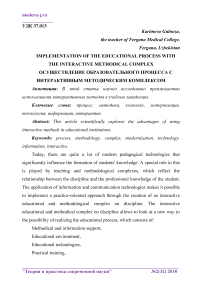Implementation of the educational process with the interactive methodical complex
Автор: Karimova G.
Журнал: Теория и практика современной науки @modern-j
Рубрика: Основной раздел
Статья в выпуске: 2 (32), 2018 года.
Бесплатный доступ
This article scientifically explores the advantages of using interactive methods in educational institutions.
Process, methodology, complex, modernization, technology, information, interactive
Короткий адрес: https://sciup.org/140289466
IDR: 140289466
Текст научной статьи Implementation of the educational process with the interactive methodical complex
Today, there are quite a lot of modern pedagogical technologies that significantly influence the formation of students' knowledge. A special role in this is played by teaching and methodological complexes, which reflect the relationship between the discipline and the professional knowledge of the student. The application of information and communication technologies makes it possible to implement a practice-oriented approach through the creation of an interactive educational and methodological complex on discipline. The interactive educational and methodical complex on discipline allows to look at a new way to the possibility of realizing the educational process, which consists of:
Methodical and information support,
Educational environment,
Educational technologies,
Practical training,
Research work of the student.
The interactive educational and methodological complex for discipline includes components in various formats and tools that provide the possibility of organizing a complete educational process, the implementation of all the training activities necessary to achieve results. The student is offered a special information environment that allows learning the material using lecture notes, as well as a wider multimedia space consisting of block parts:
-
• organizational,
-
• information,
-
• assimilation of concepts,
-
• formation of skills,
-
• control,
-
• management.
The organizational unit ensures the sequence of the educational process. This includes - a curriculum, a typical discipline program, a work program of discipline.
The information block and the conceptualization block include various electronic materials. This and educational literature, various documents, presentations. Presentations allow to activate the cognitive process itself. Navigation, as a system of hyperlinks, built into the tutorial, allows you to manage learning activities. In this case, the student himself can choose an educational route depending on the personal goals that he sets for himself, to study various terms and understand their meaning.
The skill building block can include training test tasks, tasks in the form of crossword puzzles, questions, various situations. This unit forms professional knowledge based on educational information.
The block of management of the interactive educational-methodical complex on the discipline makes it possible to create a feedback, which significantly increases its effectiveness in the educational process. The student can independently measure the volume of training activities under the program of the module course and take into account the results. A set of tools allows the student not only to master the material, perform tasks, but also to make their changes in the learning environment. This increases its importance, the student becomes an active participant in the educational process.
To date, there is no single approach to the design and implementation of interactive teaching and methodological complexes for disciplines. Therefore, in the context of the implementation of the system approach, it is necessary to develop interactive training and methodological complexes that reflect the interdependence between the student's professional knowledge and the discipline being studies. Proceeding from this, it is possible to single out the general organizational and methodological requirements that such complexes should meet:
-
• Alternative actions of teachers and students,
-
• the choice of training and Activities,
-
• the conscious professional and personal development of the student,
-
• the availability of opportunities for self-development,
-
• the logical interrelation and the systemic nature of the components of the teaching and methodical complex,
-
• optimality and compliance with training objectives.
Actual is the issue of increasing the effectiveness of interaction between the teacher and the student. When using interactive educational and methodological complexes for disciplines, the student is a participant in the process of perception, his experience serves as the main source of learning cognition. Interactive training with the help of an electronic educational and methodical complex provides:
-
• high motivation,
-
• awakening the students' interest in discipline,
-
• effective assimilation of educational material,
-
• strength of knowledge,
-
• independent search for options and ways to solve the tasks,
-
• development of creativity and imagination,
-
• communication skills,
-
• formation of opinions and attitudes among learners,
-
• an active life position,
-
• Freedom of expression.
All that forms professional-communicative and information competence, which is the main priority of modern higher education.
Список литературы Implementation of the educational process with the interactive methodical complex
- Chitailo A.I. Gaming adapter PC in the school physical experiment Information and communication technology in teacher education. 2016. No. 1 (01). Pp. 20-24.
- Sato S., Nagao M. Towards memory based translation. In Proceedings of COLING'90, Helsinki, Finland, 2015.


